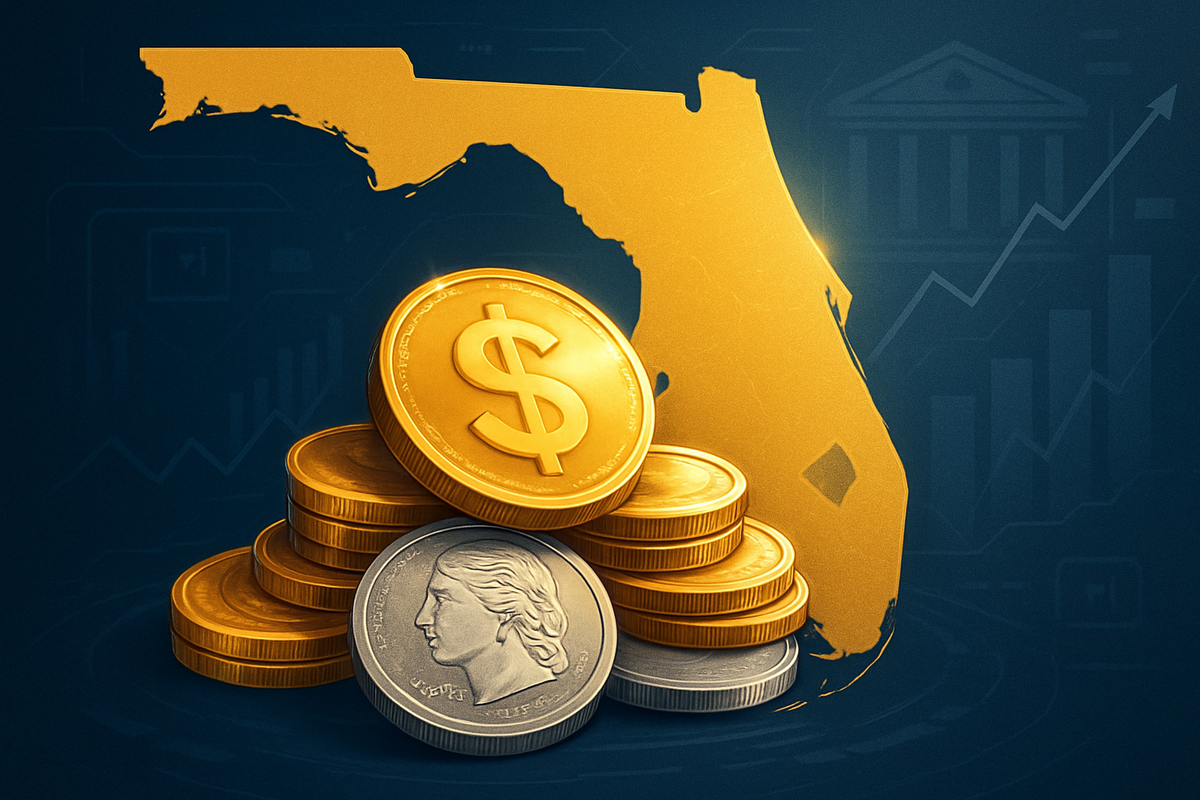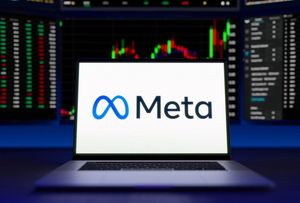
Tallahassee, FL – October 20, 2025 – A growing movement to re-establish gold and silver as foundational elements of the monetary system is gaining significant traction across the United States, with Florida emerging as a key player. While the Sunshine State has long been free of state-level capital gains taxes, recent legislative actions, specifically the removal of sales tax thresholds on precious metals purchases and the impending recognition of gold and silver as legal tender, are sending ripples through the financial world. These measures are not merely symbolic; they represent a tangible shift towards embracing alternative forms of money amidst widespread concerns over inflation and currency stability.
The immediate implications of Florida's legislative push are multifaceted. By eliminating sales tax on all precious metal bullion purchases and setting the stage for gold and silver to be accepted for payments, the state is making it easier and more attractive for citizens to invest in and utilize these historical forms of money. This trend, echoing similar movements in other states, challenges the exclusive dominance of fiat currency and signals a potential paradigm shift in how Americans view and interact with their money, offering a hedge against economic uncertainties and a return to constitutional monetary principles.
Florida's Bold Move: A Deep Dive into the Legislation
Florida's journey towards solidifying the status of precious metals has been a carefully orchestrated legislative effort. While Florida has historically not imposed a state income tax, and therefore no state-level capital gains tax on precious metals sales, the recent focus has been on removing other barriers to their widespread adoption. A significant development was the passage of House Bill 7031, which codified adjustments to Florida Statutes and administrative code. This bill, effective August 1, 2025, officially removed the $500 minimum purchase requirement for sales tax exemption on gold, silver, and platinum bullion. Previously, smaller purchases were subject to sales tax, deterring many smaller investors. Now, all qualifying bullion purchases, regardless of value, are exempt from state sales tax, including bars, coins, or rounds of recognized purity held primarily for investment purposes.
Further cementing Florida's commitment to "sound money," Governor Ron DeSantis signed House Bill 999 into law on May 27, 2025. This landmark legislation aims to recognize gold and silver coins as legal tender within the state. While the full implementation of this aspect is slated for July 1, 2026, it is contingent upon the Chief Financial Officer and Financial Services Commission adopting comprehensive rules by November 1, 2025, and subsequent ratification by the Legislature in the 2026 session. If enacted, this would allow gold and silver to be used for the payment of debts, taxes, fees, and other government payments, with businesses having the option to voluntarily accept them. The law also prudently includes provisions for the development of electronic payment systems backed by physical gold and silver, acknowledging the practicalities of modern commerce.
Key players in this legislative push include Governor Ron DeSantis, who has championed conservative fiscal policies, and various state legislators who sponsored and advocated for these bills. Advocacy groups like the Sound Money Defense League and the national Campaign for Liberty have also played crucial roles in educating lawmakers and the public about the benefits of precious metals as legal tender. Initial market reactions have been positive among precious metals dealers and investors, who see Florida as an increasingly attractive jurisdiction for buying and holding gold and silver. While the broader financial markets are still digesting the long-term implications, the immediate sentiment within the precious metals community is one of optimism and validation.
Companies Poised to Win or Lose in the Golden Shift
The growing recognition of gold and silver as legal money, spearheaded by states like Florida, presents a significant shift that will undoubtedly impact various companies across the financial and commodities sectors. Those involved in the mining, refining, and distribution of precious metals are particularly well-positioned to benefit.
Precious Metal Miners and Refiners: Companies like Barrick Gold (NYSE: GOLD), Newmont Corporation (NYSE: NEM), and Agnico Eagle Mines Limited (NYSE: AEM) stand to gain from increased demand for physical gold and silver. As more states remove tax barriers and embrace precious metals as legal tender, the overall market for these commodities could expand, driving up prices and production. Refiners such as Valcambi and PAMP Suisse, though not publicly traded in the same way, would also see increased business as more bullion is processed and certified for investment and transactional use. Increased accessibility and reduced costs for consumers could translate into higher sales volumes for these upstream players.
Precious Metal Dealers and Depositories: Businesses specializing in the sale and storage of physical gold and silver are direct beneficiaries. Companies like APMEX, JM Bullion, and SD Bullion (private companies, but representative of the sector) are likely to see a surge in customer interest and sales, especially in states like Florida where sales tax exemptions make purchases more attractive. The development of secure depositories and vaulting services, such as the Texas Bullion Depository, will also become increasingly critical. Publicly traded companies with exposure to physical asset management or secure storage solutions could also see an uptick.
Financial Technology (FinTech) Companies: The provision in Florida's HB 999 for electronic payment systems backed by physical gold and silver opens a new frontier for FinTech innovation. Companies that can develop secure, efficient, and user-friendly platforms for transacting with digitized gold and silver could emerge as significant winners. This could include established payment processors or new startups specializing in blockchain-based precious metals solutions.
Traditional Financial Institutions: Banks and other traditional financial institutions might face both challenges and opportunities. On one hand, a shift towards alternative currencies could potentially reduce reliance on fiat currency deposits and traditional banking services. On the other hand, there's an opportunity for these institutions to adapt by offering precious metal-backed accounts, lending services against bullion, or facilitating transactions in gold and silver, thereby diversifying their offerings and catering to a new market segment. Those slow to adapt, however, could see some erosion of their market share as consumers explore alternative financial ecosystems.
The Wider Significance: A Return to Sound Money Principles
Florida's legislative actions are not isolated incidents but rather a significant acceleration of a broader, national movement rooted in the U.S. Constitution's Article I, Section 10, which mandates that "No State shall… make any Thing but gold and silver Coin a Tender in Payment of Debts." This "sound money" movement is gaining considerable momentum across approximately 20% of U.S. states, with 43 states having already eliminated sales taxes on precious metals by 2025. States like Utah, Oklahoma, and Texas have been at the forefront, with Texas, for instance, passing a law in 2025 to make gold and silver usable as legal tender starting May 1, 2027, particularly through digital systems linked to the Texas Bullion Depository.
The primary motivation behind this trend is a deep-seated concern over persistent inflation, the ongoing devaluation of the U.S. dollar (a fiat currency), and the overall stability of the federal monetary system. States are seeking to provide their citizens with a robust alternative monetary system, a hedge against federal monetary policies over which they have no control, and a pathway to greater financial resilience. By removing tax barriers that treat precious metals as mere commodities rather than money, these states are symbolically and practically elevating their status.
The potential ripple effects on competitors and partners are substantial. States that maintain sales taxes on precious metals may find themselves at a disadvantage, as investors and dealers could gravitate towards tax-free jurisdictions like Florida. This could spur a competitive race among states to adopt similar "sound money" policies to attract investment and retain wealth. Furthermore, the development of state-level bullion depositories and precious metals-backed payment systems could create an alternative financial infrastructure, potentially influencing federal regulatory bodies to reconsider their stance on precious metals taxation, particularly the federal capital gains tax on collectibles (currently 28%) which still applies to precious metals.
Historically, the U.S. has a rich tradition of bimetallism and a gold standard. The shift away from the gold standard in the 20th century led to the current fiat money system. This modern movement can be seen as a historical corrective, an attempt to reintroduce tangible, universally recognized stores of value into the monetary fabric. It draws parallels to periods of economic uncertainty when populations naturally turn to hard assets for security, but with a modern twist: the integration of these assets into digital payment systems.
What Comes Next: Navigating the Future of Money
The path forward for gold and silver as legal money in the United States is fraught with both exciting possibilities and significant challenges. In the short term, the focus in Florida will be on the successful adoption of comprehensive rules by November 1, 2025, and subsequent legislative ratification in 2026 for HB 999 to fully take effect. This regulatory clarity will be crucial for businesses and individuals to understand how to legally and practically use gold and silver in transactions. We can anticipate increased interest from precious metal investors and a potential influx of bullion dealers into Florida, capitalizing on the sales tax exemption. Other states are likely to closely watch Florida's implementation, potentially accelerating their own "sound money" initiatives.
Long-term possibilities are even more transformative. If the trend continues and more states embrace precious metals as legal tender, a parallel monetary system could begin to emerge, offering citizens a choice between fiat currency and constitutionally recognized gold and silver. This could lead to the widespread development of sophisticated electronic payment systems that seamlessly integrate physical precious metals, making their use as currency as convenient as using a debit card. Such a system could provide a robust hedge against future inflation and economic instability, fundamentally altering personal and state-level financial planning.
However, significant challenges remain. The federal government's stance on precious metals, particularly the persistent federal capital gains tax on them as collectibles, poses a major hurdle to their widespread everyday use. This tax disincentivizes transactions, treating gold and silver as investment assets rather than circulating currency. Overcoming this federal tax barrier would require substantial legislative effort at the national level. Furthermore, the practicalities of a dual currency system – including price volatility, secure storage, and the need for robust valuation mechanisms – will require careful navigation and technological innovation.
Market opportunities will emerge for FinTech companies specializing in precious metal-backed digital currencies, secure vaulting services, and specialized exchanges. Investors may increasingly diversify their portfolios with physical precious metals, seeing them not just as a store of value but as a viable transactional medium. Potential scenarios range from a gradual, state-by-state adoption leading to a patchwork monetary system, to a more unified national movement that eventually compels federal action. The ultimate outcome will depend on the continued momentum of the "sound money" movement, the success of early adopters like Florida, and the broader economic environment.
The Golden Horizon: A New Era for Financial Resilience
Florida's recent legislative actions, particularly the removal of sales tax thresholds on precious metals and the impending recognition of gold and silver as legal tender, mark a pivotal moment in the ongoing national discussion about monetary policy and financial resilience. While the state has long offered the benefit of no state-level capital gains tax, these new measures significantly enhance the appeal and usability of precious metals. The immediate takeaway is clear: Florida is actively creating an environment where gold and silver are more accessible and more readily integrated into the financial lives of its citizens, offering a tangible alternative to traditional fiat currency.
Moving forward, the market will closely monitor the successful implementation of Florida's legal tender provisions, especially the development of comprehensive rules by November 1, 2025, and their subsequent legislative ratification. The effectiveness of these measures in facilitating real-world transactions and attracting precious metals investment will serve as a crucial test case for other states considering similar policies. This trend reinforces the notion that in times of economic uncertainty, hard assets like gold and silver continue to be perceived as ultimate stores of value and hedges against inflation.
Investors should watch for several key indicators in the coming months. Firstly, monitor the progress of Florida's HB 999 implementation and any announcements regarding the electronic payment systems for gold and silver. Secondly, observe legislative developments in other states, as a domino effect could accelerate the national "sound money" movement. Thirdly, keep an eye on the broader economic landscape, including inflation rates and the stability of the U.S. dollar, as these factors will continue to fuel interest in alternative monetary solutions. Florida's bold steps are not just about tax policy; they represent a fundamental re-evaluation of money itself, potentially ushering in a new era of financial choice and resilience for Americans.
This content is intended for informational purposes only and is not financial advice





